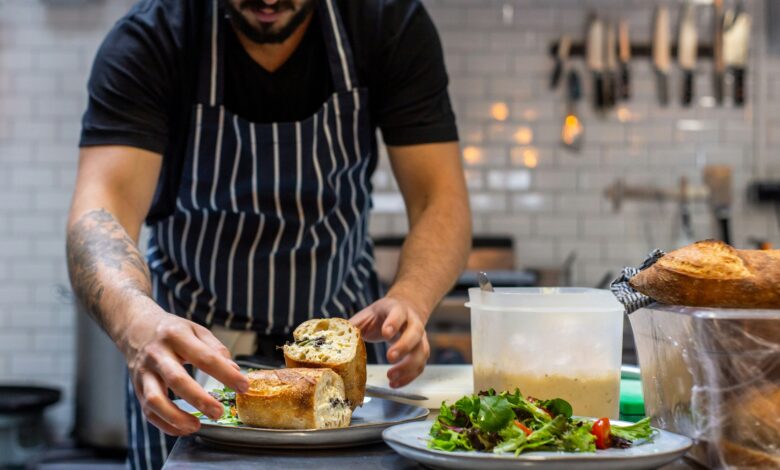How to Become a Chef: A Step-by-Step Guide

Becoming a chef is a dream for many culinary enthusiasts. The journey to becoming a chef involves a mix of education, hands-on experience, and a passion for cooking.
This comprehensive guide will walk you through the steps needed to turn your culinary dreams into reality, ensuring you understand the chef job qualifications necessary to succeed.
Step 1: Cultivate your passion for cooking
The first step in becoming a chef is cultivating a genuine passion for cooking. This can begin at home by experimenting with recipes, understanding different cuisines, and exploring various cooking techniques. Your love for food and the joy of creating delicious dishes is the foundation of a successful culinary career.
Develop basic cooking skills
Start by mastering basic cooking skills such as chopping, sautéing, and baking. These fundamental techniques are crucial and will serve as the building blocks for more complex culinary skills. Practice makes perfect, so spend time in the kitchen honing these abilities.
Step 2: Obtain formal education
While not mandatory, attending a culinary school can provide a significant advantage. Culinary programs offer structured learning, covering essential topics such as knife skills, cooking methods, and kitchen management. Additionally, culinary schools often provide networking opportunities with industry professionals.
Apprenticeships and internships
Gaining hands-on experience through apprenticeships or internships is invaluable. Working under experienced chefs allows you to learn practical skills, understand kitchen operations, and gain insight into the culinary industry. These experiences are crucial for developing the chef job qualifications needed for future employment.
Step 3: Gain professional experience
Start your career by working in entry-level positions such as line cook, prep cook, or kitchen assistant. These roles provide an understanding of kitchen dynamics and help you build the stamina and speed required in a professional kitchen.
Learn from mentors
Seek out mentors who can guide you through your culinary journey. Experienced chefs can offer advice, share their knowledge, and provide support as you navigate your career. Learning from those who have succeeded in the industry is an invaluable resource.
Step 4: Specialize and refine your skills
As you gain experience, consider specializing in a particular area of cuisine or culinary technique. Specialization can set you apart from other chefs and open up opportunities in niche markets. Whether it’s pastry, seafood, or international cuisine, focusing on a specialty can enhance your expertise and marketability.
Stay updated with culinary trends
The culinary world is constantly evolving, with new trends and techniques emerging regularly. Stay updated by reading culinary magazines, attending workshops, and following industry leaders on social media. Keeping up with trends ensures your skills remain relevant and innovative.
Step 5: Build a strong network
Networking is crucial in the culinary industry. Attend culinary events, join professional organizations, and connect with other chefs and industry professionals. Building a strong network can lead to job opportunities, collaborations, and mentorship.
Utilize social media
Use social media platforms to showcase your skills and connect with a broader audience. Share photos of your dishes, cooking tips, and behind-the-scenes glimpses of your culinary journey. A strong online presence can enhance your reputation and attract potential employers or clients.
Step 6: Consider business skills
Understanding the business side of the culinary industry is essential for those aspiring to own or manage a restaurant. Learn about restaurant management, including inventory control, budgeting, and staff management. Business acumen can significantly impact your success as a chef.
Entrepreneurship opportunities
Consider exploring entrepreneurship opportunities within the culinary field. Starting a food truck, catering business, or pop-up restaurant can be a great way to showcase your skills and gain independence. Entrepreneurship requires creativity, resilience, and a strong business plan.
Step 7: Achieve certification and recognition
Obtaining professional certification can enhance your credibility and demonstrate your commitment to the culinary arts. Certifications from recognized institutions, such as the American Culinary Federation, can validate your skills and open up advanced career opportunities.
Awards and competitions
Participating in culinary competitions and striving for industry awards can boost your profile and recognition. Success in competitions can highlight your skills and dedication, setting you apart in a competitive field.
Final thoughts
Becoming a chef requires a blend of passion, education, experience, and continuous learning. By following these steps, you can develop the chef job qualifications needed to succeed in this dynamic and rewarding profession. Whether you aspire to work in a top-tier restaurant or start your own culinary venture, dedication to your craft and a willingness to learn will guide you to success in the culinary world.


